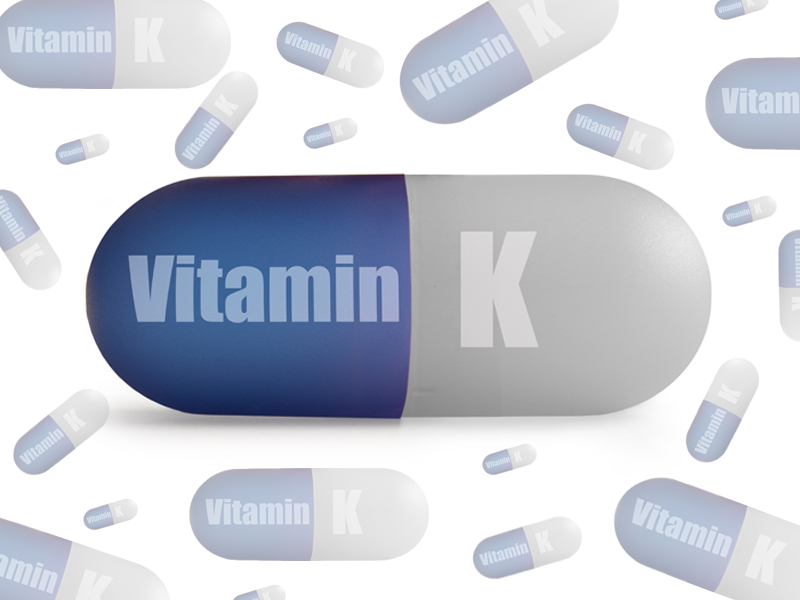Get Easy Health Digest™ in your inbox and don’t miss a thing when you subscribe today. Plus, get the free bonus report, Mother Nature’s Tips, Tricks and Remedies for Cholesterol, Blood Pressure & Blood Sugar as my way of saying welcome to the community!
Vitamin K: The vitamin with a split personality

While you may be familiar with well-known micronutrients such as vitamins B and C, there is a vitamin that’s not so common that may be even more important in supporting optimal health…..
Vitamin K.
Vitamin K is often referred to as one vitamin but it actually refers to a group of fat-soluble vitamins — K1 and K2 — that can help boost very different areas of your health.
And if you’re not getting both Ks, you’ll miss out on some major benefits…
Phylloquinone (K1) is found in green leafy vegetables. Menaquinone (K2) is found in butter, egg yolks, lard and animal-based foods, and can also be produced by your gut bacteria.
One of vitamin K’s roles, in which both K1 and K2 are helpful, is to act as a blood-clotting agent. Without vitamin K, getting a small cut while shaving could turn into a pool of red disaster. And undergoing any kind of surgery, well, that could be life-threatening.
But aside from its important role as a blood-clotting agent, it works in many other ways to keep your body working in tip-top shape…
Promote strong healthy bones
If you think vitamin D is all you need to healthy strong bones, think again…
- One study found that in patients with osteoporosis, vitamin K could prevent fractures of the vertebrae by 60 percent, fractures of the hip by 77 percent and prevent other fractures by 81 percent.
- Another study in osteoporosis patients given 45μg (micrograms) of vitamin K2 per day, in conjunction with a calcium supplement, found they had zero bone loss, maintained their bone density over a 2-year period and had a 65 percent reduced risk of fracture!
- In contrast, the patients who received only calcium supplements lost 2.5 percent of their lumbar bone density in the 2-year period.
K2 benefits bone health because it is helpful as directing calcium to places it’s needed, like bones, and away from places it’s not — which is why it also helps…
Reduce your risk of deadly heart conditions
Vascular calcification reduces the elasticity of the heart and the arteries, and it’s one of the risk factors connected to coronary heart disease. Vitamin K2 works its magic by reducing the risk of calcification from occurring…
- One study following 16,057 women for over 8 years found that for each 10μg increase in vitamin K intake, there was a 9 percent reduction in coronary events — meaning less chance of a heart attack or stroke.
- Another study evaluating what happens when people increase vitamin K2 found a 27 percent lower risk of coronary heart disease when consuming 21.6 to 32.7μg per day, and a whopping a 57 percent decreased risk when consuming more than 32.7μg per day!
And if those benefits aren’t enough to encourage you to eat vitamin K-rich foods, you’re going to love the following facts…
Beat arthritis, cancer and cognitive decline
- Sufficient daily vitamin K intake helps reduce joint narrowing in osteoarthritis by as much as 47 percent.
- Vitamin K has been shown to reduce the risk of diabetes by 51 percent, along with improving insulin function and decreasing insulin resistance.
- When researchers examined 11,000 patients they found those who had higher intakes of vitamin K had reduced risk of cancer.
- Vitamin K promotes cognitive function and may prevent the development of Alzheimer’s disease, as it plays an important role in the synthesis of fats in the brain.
And that’s just the tip of the iceberg…
The recommended daily intake of vitamin K is 90μg (micrograms) for women and 120μg for men. But if you take a supplement, you should make sure it contains both K1 and K2.
That’s why I prefer to get my K from food. I load up on plenty of green leafy green vegetables — spinach, kale, collard greens, turnip greens and beet greens to cover K1. And make sure I’m eating eggs (and don’t skip the yolks) because that’s where you’ll find vitamin K2’s nourishing goodness. But for the food with the highest source of K2, you’ll have to reach for a traditional dish called natto, the Japanese secret to healthy circulation.
Sources:
- Harshman SG, et al. Vegetables and mixed dishes are top contributors to phylloquinone intake in US adults: data from the 2011-2012 NHANES. — Journal of Nutrition. 2017;147(7):1308-1313.
- Hao G, et al. Vitamin K intake and the risk of fractures: a meta-analysis. — Medicine. 2017;96(17).
- Vitamin K — (2017). Nih.gov. Retrieved 23 July, 2017.
- Schwalfenberg G. Vitamins K1 and K2: the emerging group of vitamins required for human health. — Journal of Nutrition and Metabolism. 2017.












